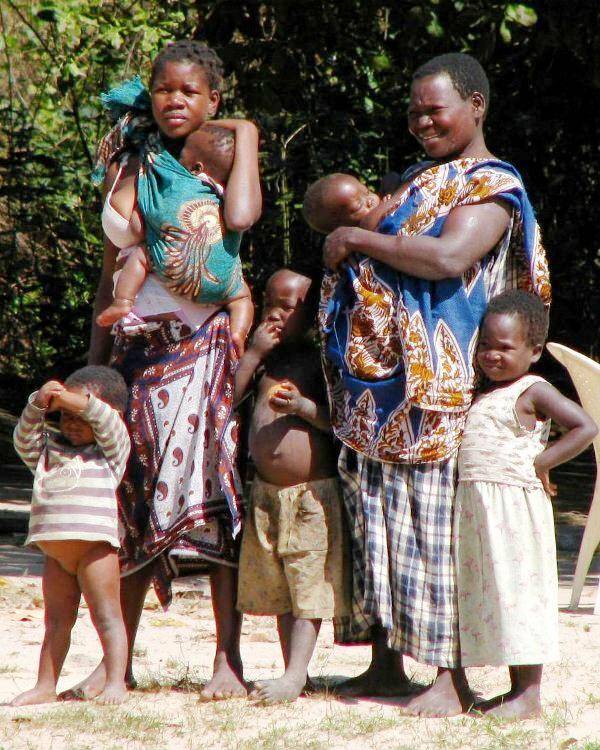
Figure 1.-- Here are two Mozambican mothers in their colorful dresss with their children about 2010. Children now commonly wear Western clothing and traditional styles are disappearing. |

|
Mozambique is located in Southeast Africa between the Mozambique Channel of the Indian Ocean and Malawi, Zambia and Zimbabwe to the west. Tanzania and South Africa are located to the north and south. Much of the country like Madagascar lies north of the Tropic of Capricorn giving Mozambique a tropical climate. The country comprises much of the coast of southwest Africa, The capital city is Maputo, known as Lourenšo Marques in Portuguese colonial times. Coastal lowlands giveway to interior savana higlands. Bantu-speaking peoples migrated from the north and west into what is now Mozambique (1st and 5th centuries AD). Arab traders set up coastal trading posts (bginning in the 8th century). Swahili, a Bantu lannguage, included by contact with Arabs developed as a kind of lengua franca in East Africa. Europeans arrived (late-15th century) and also set up trading posts along the coast. The Portuguese were the first to round the Cape of Good Hope. Vasco da Gama explored the area of modern Mizambique (1498). The Portuuese set up trading posts along the coat (1505), but for three centuries did not move inland in any major way and colonize the area. The Portuguese expanded the eisting Arab slave trade. The portuguese respondibg to international pressure abolished slavery (1878). The Portuguese formaly established a colony (1907) and afer World War II changed the status to an overseas province (18\951). Portugal after an extended colonial war granted independence (1975). The People's Republic of Mozambique's Frelimo movement adopted Marxist policies. This and mismanagement impeded any kind of modern economic develoopment. Mozambican support for nationalist groups struggling with hite-minority rule governments in Rhodesia and South Africa led to both countries sponsoring the opposition Renamo movement leading to civil war (1977-92). As a result the economy declined after indepndence. Some people even faced famine. A peace deal ended 16 years of civil war (1992). The country has negun reporting some progress in economic development and a degree of political stability has been achieved. Mozambique has a potentially prosperous economic future and is endowed with substantial natural resources. The country's economy is, however, still based primarily on agriculture. Agrucultural exports incluse cotton, cashews, copra, amd tea.
There are significant natural resources including absestous, bauxite, beryl, coal, and gold. The economy benrfits from port and rail services into the interior (Botswana, Zimbabwe, Malawi, Zaire/Congo, and Zambia). Mozambique made little progress after independence in building a school system. The civil war was a major factor. The country has made real prgress after the war ended, although enormous problems remain.
Mozambique is located in Southeast Africa between the Mozambique Channel of the Indian Ocean and Malawi, Zambia and Zimbabwe to the west. Tanzania and South Africa are located to the north and south. Much of the country like Madagascar lies north of the Tropic of Capricorn giving Mozambique a tropical climate. The country comprises much of the coast of southwest Africa, The capital city is Maputo, known as Lourenšo Marques in Portuguese colonial times. Coastal lowlands giveway to interior savana higlands.
Bantu-speaking peoples migrated from the north and west into what is now Mozambique (1st and 5th centuries AD). Arab traders set up coastal trading posts (bginning in the 8th century). Swahili, a Bantu lannguage, included by contact with Arabs developed as a kind of lengua franca in East Africa. Europeans arrived (late-15th century) and also set up trading posts along the coast. The Portuguese were the first to round the Cape of Good Hope. Vasco da Gama explored the area of modern Mizambique (1498). The Portuuese set up trading posts along the coat (1505), but for three centuries did not move inland in any major way and colonize the area. The Portuguese expanded the eisting Arab slave trade. The portuguese respondibg to international pressure abolished slavery (1878). The Portuguese formaly established a colony (1907) and afer World War II changed the status to an overseas province (18\951). Portugal after an extended colonial war granted independence (1975). The People's Republic of Mozambique's Frelimo movement adopted Marxist policies. This and mismanagement impeded any kind of modern economic develoopment. Mozambican support for nationalist groups struggling with hite-minority rule governments in Rhodesia and South Africa led to both countries sponsoring the opposition Renamo movement leading to civil war (1977-92). As a result the economy declined after indepndence. Some people even faced famine. A peace deal ended 16 years of civil war (1992). The country has negun reporting some progress in economic development and a degree of political stability has been achieved.
Mozambique has a potentially prosperous economic future and is endowed with substantial natural resources. The country's economy is, however, still based primarily on agriculture. Agrucultural exports incluse cotton, cashews, copra, amd tea.
There are significant natural resources including absestous, bauxite, beryl, coal, and gold. The economy benrfits from port and rail services into the interior (Botswana, Zimbabwe, Malawi, Zaire/Congo, and Zambia).
Mozambique made little progress after independence in building a school system. The civil war was a major factor. The country has made real prgress after the war ended, although enormous problems remain.
Navigate the Boys' Historical Clothing Web Site:
[Introduction]
[Activities]
[Biographies]
[Chronology]
[Cloth and textiles]
[Clothing styles]
[Countries]
[Topics]
[Bibliographies]
[Contributions]
[FAQs]
[Glossaries]
[Images]
[Links]
[Registration]
[Tools]
[Boys' Clothing Home]
Navigate the Boys' Historical Clothing national pages:
[Return to the Main African page]
[Angola]
[Botswana]
[Congo/Zaire]
[Ethiopia]
[Gabon]
[Ivory Coast]
[Kenya]
[Lesotho]
[Madagascar]
[Malawi]
[Mali]
[]
[Somalia]
[South Africa]
[Swaziland]
[Tanzania]
[Uganda]
[Zambia]
[Zimbanwe]
